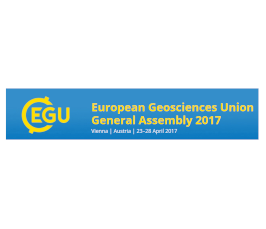European Geosciences Union General Assembly 2017
- Start: Apr 23, 2017
- End: Apr 28, 2017
- Host: Markus Reichstein, Dorothea Frank, Sönke Zaehle, Miguel Mahecha, Thomas Wutyler, Marion Schrumpf, Sujan koirala

BG1.5/CL2.33 Climate extremes, biosphere and society: impacts and feedbacks (co-organized)
(Co-)Convener: Markus Reichstein; Dorothea Frank
This session explores the linkages between climate extremes, biosphere
and societal dynamics. I.e. emphasis is laid on 1) what impacts are
caused by climate extremes on various aspects of the biosphere (incl.
e.g. productivity, biogeochemical cycling, biodiversity) and society
(e.g. political, economic aspects), and 2) which feedbacks exist
amplifying or moderating the intensity, duration or extent of climate
extremes. Empirical, theoretical and modelling studies from local to
global scale are all highly welcome.
BG2.21 Plant traits and biogeochemical cycles
23–28 April 2017
Co-convener: Markus Reichstein, Sönke Zaehle
Plant traits extend the range of earth observations to the level of
individual organisms, providing a link to ecosystem function and
modeling in the context of rapid global changes. However, overcoming the
differences in temporal and spatial scales between plant trait data and
biogeochemical cycles remains a challenge. This session will address
the role of plant species, biodiversity and adaptation / acclimation in
the biogeochemical cycles of water, carbon, nitrogen and phosphorus. We
welcome conceptual, observational, experimental and modeling approaches,
and studies from the local to the global scale, including e.g. remote
sensing observations.
23–28 April 2017
Co-convener: Miguel Mahecha
As we progress through an exponential increase in satellite data
availability, this session aims to bring researchers together to discuss
the current state in big data and machine learning applications to
Earth sciences and remote sensing. We aim to both (a) discuss current
efforts, and (b) identify common challenges for the future. We encourage
authors to submit presentations on: machine learning applied to
geosciences and remote sensing, data-driven methods to analyse
spatiotemporal dynamics and causal relationships in Earth observations,
enlightening opinions about interface between mathematics and climate
science.
23–28 April 2017
(Co-)Convener:Thomas Wutzler; Marion Schrumpf
Elemental cycles of carbon, nitrogen, phosphorous, and other nutrients
are intimately linked by soil organic matter (SOM) and the narrow
stoichiometric flexibility of decomposers. Current environmental
changes, such as increasing atmospheric CO2 concentrations, nitrogen (N)
deposition, and land management affect elemental ratios and amount of
matter inputs along with the decomposer community. Hence, in order to
understand the important consequences for soil carbon (C) storage and
nutrient cycling, a better understanding of C-nutrient cycle
interactions in soil systems is required. The understanding of those
interactions is challenged by complex relations among biological and
abiotic drivers including microbial ecophysiology, resource-use
efficiency, enzymatic reactions, and stoichiometric constraints, and it
is also challenged by the need to integrate processes at several scales.
This session welcomes presentations addressing these interactions and
challenges. It welcomes insights from experimental lab and field works,
as well as theoretical and applied modelling perspectives.
23–28 April 2017
(Co-)convener:Sujan Koirala
The steadily growing observational archives with a diverse data ranging
from point-scale in-situ observations to regional-to-global remote
sensing products have a potential to provide an unprecedented view of
the underlying physical processes at many spatial and temporal scales.
The true worth of these data archives will, however, only come forth
when they are meaningfully applied to test and address practical and
scientific research questions.
Therefore, this session invites contributions encompassing:
- Theory advancing hydroclimatological analysis,
- Data-Driven Approaches,
- Model-data integration